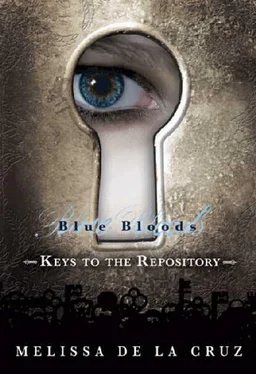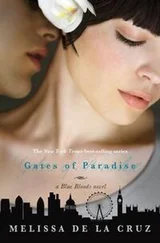So what? Schuyler thought, running a hairbrush through her dark hair before pulling it back into a ponytail. So what if he’d given her a book and key? She was still miserable. She was still living with them and not her grandfather. Ever since she’d arrived, she had been made to feel as welcome as Jane Eyre at Gateshead with her rich cousins. She was lucky that Mimi hadn’t locked her in the closet yet.
And so what if he’d kissed her the day before? His kisses meant nothing. He had kissed her and run off three times now —the first at a party, the second at the masquerade ball, and the third in her bedroom yesterday. It was just yesterday. She tried to shake off the memory, pulled on her coat and headed downstairs. She wanted to leave while the house was still quiet; she didn’t want to risk bumping into anyone, wanted the chance to slip away as quietly as possible without anyone noticing.
She walked out and took a deep breath of fresh air. She couldn’t understand him. What did he want? He was bonded to
Mimi, wasn’t he? And yet he had kissed her yesterday afternoon, and then had disappeared so quickly she had to assume he was repulsed by her, or perhaps repulsed by his attraction to her, which was just as humiliating. Maybe he only liked her when no one else was looking. . . . Maybe he was just playing a game . . . toying with her emotions while she churned with confusion and desire. . .
Three stolen kisses—it didn’t add up to anything, really. He was never going to be her boyfriend, she thought as she turned right onto 96th Street. He was never going to sling his arm around her as they walked down the hall, never take her to
Winter Ball, never declare his love over the PA system by mangling the lyrics to “Come on Eileen,” as Jamie Kip had done so charmingly last week when he’d serenaded Ally Elly, before the head girl had cut him off. But Schuyler didn’t want any of that—did she? She had never yearned for popularity. It struck her as absurd anyway, to want popularity. Popularity was fickle and elusive, like trying to catch fireflies in a jar. You were either born with it or relegated to wallflower status according to the mysterious and unknowable workings of the universe.
It wasn’t something you strove for or wished for or worked for, no matter how many silly articles and teenage novels and
Hollywood movies tried to convince you otherwise. Popularity was something other people decided for you—other people decided you were fun and pretty and interesting and wanted to be your friend. Hence, you were popular. Most people thought
Schuyler was weird, and left her alone.
She arrived at school early and ate her breakfast by her locker.
She’d brought a yogurt and banana taken from the Forces’ immaculate commercial refrigeration system (nothing so bourgeois as a fridge, of course; this was the size of a small closet). Classes wouldn’t start for another half hour yet, and she relished having the place to herself. Soon enough, the hallways would be filled with the sound of gossip and camaraderie, and
Schuyler would feel even lonelier than when she was alone. It was so much easier when no one was around.
As much as she was not the kind of girl who wished he would claim her as his own in front of everyone to see, a little part of her could not help but wish for it nonetheless. The problem with being alienated is that one is never alienated enough, she thought as students began to trickle in before the first bell. She could swath herself in black clothes and hide behind her hair, shut off the rest of the world and listen to angry music on her iPod, but somehow it was all a pose, wasn’t it?
Was she just a poser? Because why was she drawn to him, then, the kind of boy that every girl wanted to date? Didn’t that mean she was just like everyone else? If only she didn’t care so much; but she did. At heart, behind the quiet and the scowl and the indifference, she cared very, very much.
And then, there he was. Right in the middle of a group of laughing, joking boys—always right in the center, the tallest and handsomest one—the one you couldn’t help but stare at. . .
Jack Force. He must have just gotten back from crew practice on the Hudson. She could always tell when he had been rowing; she could smell the sea air on his skin, in his hair, his cheeks were ruddy and flushed. He looked happy.
For the briefest second he caught her eye—but then turned away.
Schuyler bent down to her books, biting her bottom lip. She had just imagined it, hadn’t she? The kisses, everything. They didn’t exist in the real world. In the real world, she and Jack were strangers. She wasn’t looking, and someone jostled her elbow so that she lost her grip on her bookbag, and the book
—The Plague—tumbled out, and she thought, If this is what some people think is a love story, they are just kidding themselves.
But aren’t all stories about love in some way?
Schuyler startled to hear Jack’s voice in her head, and looked up, but the hallway was empty. The second bell rang, and she was late.
Only the good ones, only the good stories , she thought, wondering if he could hear her, if he was listening.
The next morning, another book had been slipped underneath her door. What was this all about? Was he building her a library? This time, since the book was too thick to fit completely, it had been shoved, stuffed in the opening between the door and the floor, halfway in and halfway out, so that when Schuyler pulled it out, the paperback was bent in the middle and the pages were creased. Pride and Prejudice by Jane Austen.
This time, inside the book there was a note.
173 Perry Street. #10 N. Midnight. Use the key.
She touched the key that hung around her neck, for luck.
The Plague yesterday. Now Pride and Prejudice. Was it an alphabetical choice? she wondered, amused. Talk about a love story. Pride and Prejudice—so obvious, wasn’t it? Schuyler had always been skeptical of its pull until she had spent a long, heady weekend wrapped up in the joys of its combative romance. Elizabeth and Darcy don’t so much fall in love as fight their attraction every step of the way. Schuyler had come to love the book despite her misgivings, to hold its promise of carriages and Pemberley to her chest as stoutly as she believed that Elizabeth should have inherited the carriages and the estate on her own. It was so difficult to imagine such a stringent, corseted world for women; to imagine a life completely dependent on one’s ability to land the right guy. Still, there was something deeply appealing about such a story. It made the romance so much more . . . What did they call it?
High stakes.
In any event, Pride and Prejudice was way more appealing than The Plague.
Feeling reckless and giddy, and just a tad plucky—like the kind of girl who tramped around the marshes in the dark— she scribbled a note and slipped it under Jack’s door.
Mr. Darcy, I will be there as requested. —Elizabeth
At midnight, Schuyler slipped the key in the lock and turned it.
The apartment was dark, which made the view from the floor-toceiling windows even more breathtaking, the dark river against city lights, the West Side Highway a ribbon of yellow taxicabs.
Schuyler stepped inside and looked around. She closed the door behind her. But she was alone. No one was there.
And then, before she could breathe, there he was, solid, against her, his warm lips on hers, his hands around her waist, and she had dropped the key and the book on the floor. She wanted to cry out—to ask questions—but she could feel his heart beating against hers and the intensity of the emotion exploding between them. She returned his kisses with an ardor that she did not know she was capable of—and he buried his face in her neck as if he wanted to breathe in every part of her —and she buckled to the floor so that he fell with her, until they were lying down, still kissing, their bodies entwined like roots of a tree.
Читать дальше

![Мелисса де ла Круз - Ведьмы Ист-Энда. Приквел - Дневники Белой ведьмы[Witches of East End. Prequel - Diary of the White Witch]](/books/87885/melissa-de-la-kruz-vedmy-ist-thumb.webp)


![Мелисса де ла Круз - Кровавый Валентин[любительский перевод]](/books/194687/melissa-de-la-kruz-krovavyj-valentin-lyubitelskij-thumb.webp)







